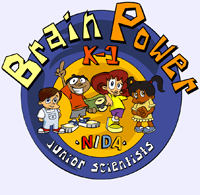
|

Protecting Your Brain (Module 5)
You can also download this entire module in PDF format by clicking the following link: Module 5 [PDF 1.5 MB]
Introduction
During the previous mission, students discussed specific things they can do to keep their body and brain healthy. This final mission in the program continues with that theme but with a slightly different focus. This mission discusses the differences between helpful medicines, such as Tylenol, aspirin, and antibiotics, and harmful drugs, such as alcohol and nicotine. Many adults consume alcohol daily, and, while this is not a problem, it can pose negative effects if not used in moderation. Children should never drink alcohol. Nicotine is found in tobacco and is very addictive. Tobacco products are also illegal for children. Students will learn about the effects these substances have on the body and the brain.
They will also learn important information about the use of helpful medicines, such as who should administer the medications, when they should be taken, and how much should be given. By the end of the module, students will have some understanding of the potency of medications and the importance of taking them properly.
|
Also included in this module is information about cocaine and marijuana. If you think your students are ready, you can introduce the topic of illegal drugs to them and discuss their effects on the brain and why they are harmful.
|
Learning Objectives
- Students learn about the differences between helpful medicines and harmful drugs.
- Students learn about the effects that both medicines and drugs have on the brain and the body.
- Students learn about the importance of taking helpful medicines carefully, under the right circumstances, and with adult supervision.
|
Module 5 Contents
|
Module 5 Documents
|
|

|

|

|
Ordering Information
This package can be ordered by calling
1-877-NIDA-NIH and request "BPPACK1"
Or it can be ordered online at backtoschool.drugabuse.gov.
|
|
Contact Information
For questions regarding NIDA's Science Education Program and Materials, contact
Cathrine Sasek, Ph.D., e-mail: csasek@nih.gov.
|
|